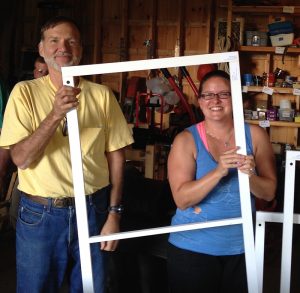Addressing Energy Justice Through Community Energy

Institution: University of Maine
Sponsor: Senator George J. Mitchell Center for Sustainability Solutions
Energy justice seeks to make sustainable energy SOLUTIONS (renewable energy and energy efficiency) more accessible to traditionally underrepresented groups (e.g., people of color, low-income people, Indigenous people, and people living in rural areas) and reduce the disproportionately negative impacts of fossil fuels and other destructive energy options to these groups. This project addresses the solutions-side of energy justice with a pilot project in an Indigenous community.
Community energy involves a GROUP of people coming together to solve an energy issue. Workshops for building insulating window inserts are a type of community energy project that involves people working together in a “barn-raising” type of event to construct window inserts for each other.
Window inserts are pine frames wrapped in two layers of transparent plastic and lined with weather stripping, which are installed on the interior side of existing windows to reduce heat loss, save energy and money, and protect the environment. WindowDressers is a Maine-based nonprofit organization that supports volunteers in communities across Maine and Vermont in implementing these workshops.
Dr. Sharon Klein is partnering with WindowDressers, the Penobscot Nation Housing Department, and a Penobscot Nation citizen (Shantel Neptune) to implement a community workshop to build window inserts on Indian Island on September 30 – October 5, 2021.
Klein and Neptune, along with a team of UMaine undergraduate students, will conduct surveys and interviews with Penobscot Nation citizens involved in the workshop to address the question: Can community workshops to build window inserts provide a pathway for underrepresented groups (Indigenous communities, in particular) to access sustainable energy benefits and potentially open the door to future sustainable community energy action?
This big question that will not be answered solely by a pilot project, but this project will be the foundation for a partnership that will grow and continue to address this question beyond the timeline of this grant.
The project team will use the new UMaine-Penobscot Nation Institutional Review Board process developed by Dr. Darren Ranco and others to ensure this work follows protocols for decolonized social science research.
Project Lead:
- Sharon Klein, Associate Professor, School of Economics, UMaine
Research Team:
- Shantel Neptune, Coordinator, Wabanaki Public Health
- Michael Bush, Director, Penobscot Nation Housing Department
- Laura Seaton, Executive Director, WindowDressers
